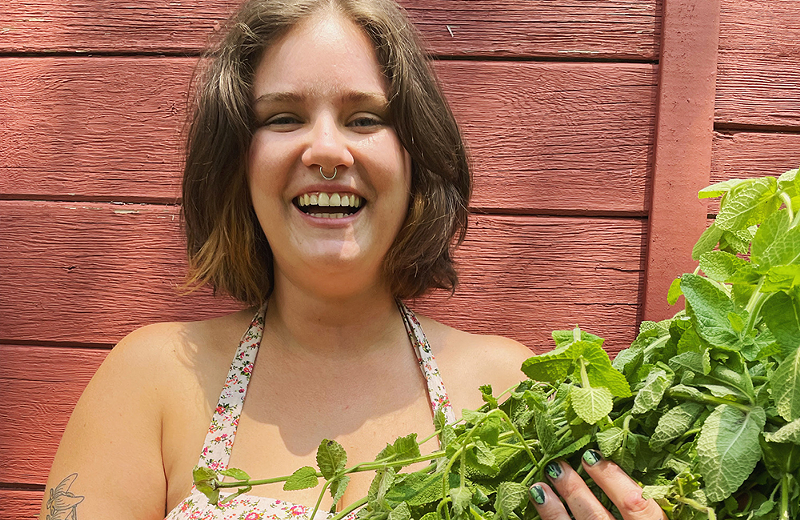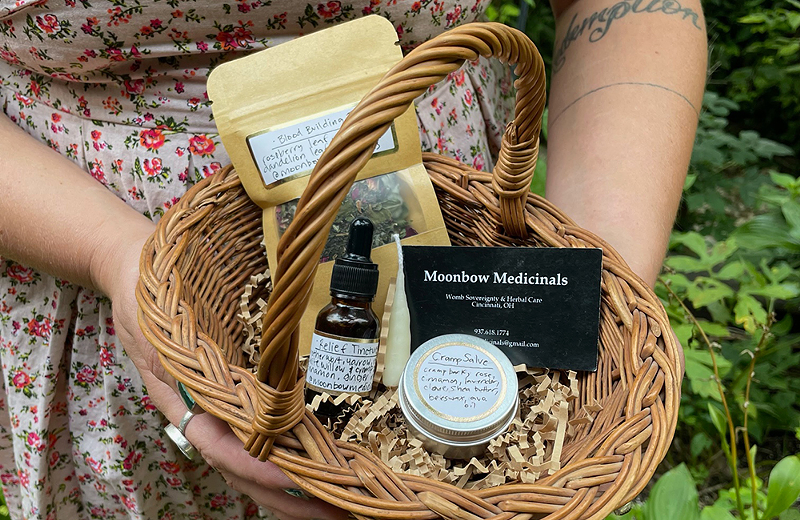Mugwort. Cramp bark. Wormwood. Raspberry leaf. Nettle. Yarrow.
These are just a few of the herbs Ellie Mae Mitchell, founder of Moonbow Medicinals, regularly uses in her practice as a womb worker.
Many of these same herbs historically have been used by midwives to assist women in all stages of childbirth. Mitchell — who is not a licensed midwife but a womb sovereignty herbalist — creates herbal products meant to aid and nourish clients through several aspects of womb care, from menstrual cycles to miscarriages, pregnancy and abortion. She sources plants from her farm sites and by foraging.
“Indigenous people all over the world have been using medicine to manage fertility,” Mitchell says. “Predating Christianity or any monotheistic religion, human beings have looked toward the earth in sacredness. There’s a deep-rooted connection between human beings and using plant medicine.”
Moonbow Medicinals was founded last summer, but it wasn’t until a few months ago that Mitchell quit her “9-to-5 corporate farm gig” to pursue the small business. Her interest in herbalism, however, goes back 15 years. Raised on a farm in Appalachia, her family grew most of their own food and did animal husbandry.
“We were pretty self-sustaining. I got into herbalism as a teenager through practicing witchcraft,” Mitchell says. “I recognized that a lot of these plants that had magical properties also had medicinal properties. This opened up this whole world of, ‘What did people do before pharmaceuticals?’ We had village doctors that practiced herbal medicine.”
Starting in 2017, Mitchell volunteered and trained through Planned Parenthood as an abortion doula (someone who provides support to those seeking or undergoing an abortion). At the time, Ohio was making headlines for its “heartbeat bill,” one of the most restrictive in the U.S., which would have banned abortions as early as six weeks gestation. Though Ohio’s legislature passed the bill in 2019, it was blocked by a federal judge and never went into effect.
Still, a study in the American Journal of Obstetrics & Gynecology found that about 26% of women in Ohio were unsure about the legality of abortion after the bill was passed — and then blocked. Another 10% thought abortion was outright illegal. According to the study, already disenfranchised groups were more likely to believe this, adding to the existing systemic barriers standing in the way of accessibility to proper women’s health care.
While volunteering with Planned Parenthood, Mitchell says she saw “the stark need for empathetic care within the medical paradigm.” But she found herself being called more toward supporting people at home.
She points out that having an herbal abortion was legal and commonplace in the United States for most of the 18th and 19th centuries. According to CNN, it wasn’t until 1880 that abortions became criminalized, a move led partly by American male physicians who sought control over women’s reproductive health and a tighter hold on the market, edging out midwives and herbalists.
Along with training from Planned Parenthood, Mitchell has taken courses at Midwest Herb Fest, the Chestnut School of Herbal Medicine and The Wander School, as well as other independent studying. She’s also taken courses from Samantha Zipporah, a fertility, sex and cycle educator.
“I met (Zipporah) right when I started at Planned Parenthood. She was on a teaching tour around the country with a womb sovereignty course,” Mitchell says. “I hosted her at my farm. When that happened, I described it as a gong going off in my chest. Everything changed. I was like, ‘This is what I’m supposed to be doing.’”
The herbs Mitchell uses in her practice are cultivated in multiple locations, including at her home in Price Hill’s Enright Urban Ecovillage. Another site is a quarter-acre at the Woodcock Nature Preserve in Athens, Ohio, where she is growing 800 cotton plants alongside flowers, milky oats and clover as part of an alley cropping grant from Rural Action, which aims to develop Appalachia’s “assets in environmentally, socially and economically sustainable ways.” She plants her crops between chestnut tree saplings at the preserve.
“When I’m out there, I forage for yarrow (and roses) in the prairies,” she says, adding that she tries to use items either grown or foraged in everything she makes.
Her Moonbox is one piece of her overall mission. Mitchell gestures to the items included in the monthly CSA-style box, sent out to clients just before the full moon. Each handcrafted item — a cramp salve, blood-building tea, menstrual relief tincture and a handmade beeswax ritual candle — is meant to “nourish, soothe and bring balance to the body during and after menstruation.”
“I remember being so embarrassed the first time I menstruated because I wasn’t really taught what was happening,” Mitchell says. “It makes me really sad for all the people that have to feel like they have to hide it. I want to support people by having these tools that they can honor their cycle with and be a little bit in tune with it.”
One moon cycle’s worth — one month of supplies — costs $40, with additional share options available. A one-on-one herbal consultation is $30, and is recommended for “anyone interested in fertility awareness or other issues related to womb-care,” she says.
Mitchell is working to roll out additional products, such as reusable gender-neutral menstrual underwear and crescent-moon-shaped womb pouches that can be heated. Regarding the former, she explains that single-use plastics are one of the most detrimental things to our environment, and the majority of menstrual products happen to be full of the stuff. Most products on the market are made for ciswomen; Mitchell’s products will be genderless so that all people with uteruses can feel seen and empowered.
In June, Mitchell led a workshop at Wave Pool, a contemporary art fulfillment center in Camp Washington, titled “Witchcare: Plant Medicine & Reproductive Justice.” In the class, she discussed “the history of herbal abortion care, the medicinal properties of common plants, and the intersections between witchcraft and midwifery,” according to its website. She’s also aiming to start teaching cervical self-examination courses this fall (these classes can be done as a group but Mitchell says she always has a private space for those who wish to do it alone).
Mitchell stresses that if individuals find themselves in a dire medical situation, nothing should be done without professional consultation.
“Always talk to your physician; talk to an herbalist before you do anything,” she says. “I am an herbalist and this is what I do. But don’t take something you don’t know. It’s dangerous.
“But I understand that fear and desperation pushes people to do really dangerous things, so we need more care like this in the world. That’s what I’m trying to do.”
Through Moonbow Medicinals, she hopes to support individuals’ rights to make choices for their own bodies. Community care, she says, is radical care.
For more on Moonbow Medicinals, visit moonbowmedicinals.com or @moonbowmedicinals on Instagram.
Sign up for our weekly newsletters to get the latest on the news, things to do and places to eat delivered right to your inbox.



